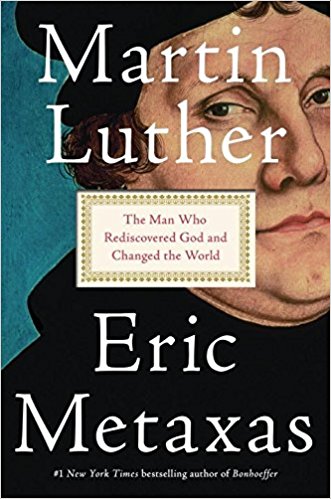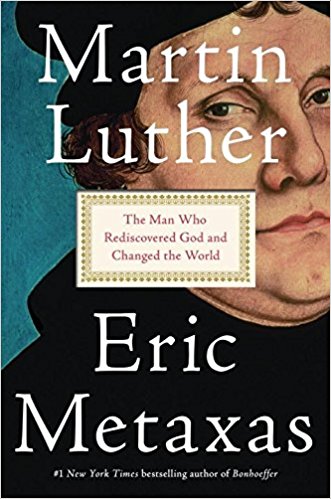Martin Luther: The Man Who Rediscovered God and Changed the World

A Denver Journal Book Review by Denver Seminary student John Crisp

Eric Metaxas. Martin Luther: The Man Who Rediscovered God and Changed the World. New York, New York: Viking, 2017. 496 pages. Hardcover, $18.93. ISBN: 978-1101980019.
On October 31, 1517, the Reformation was put into motion by the heedless actions of a disgruntled Augustinian monk named Martin Luther. One might picture the hammer pounding the nail to the church door as that historical moment when the alarm of rebellion was sounded. With each stroke of the hammer the vision of a purified Catholic church surely became clearer for Martin Luther.
Unfortunately, while all of this dramatization might seem accurate with the majority of historical accounts regarding this time, Eric Metaxas gives a different account in his recent biography Martin Luther: The Man Who Rediscovered God and Changed the World. He shares that Luther likely didn’t even nail the theses to the door until two weeks after this historical date celebrated as the dawning of the Reformation. So, what did happen on October 31 of the year 1517? Luther simply mailed a letter. It’s a scene that is difficult to charge with the weight of history-changing force the way a pounding hammer could. However, based on Metaxas’s rigorous investigation into original documents, he is able to dispel this and many other myths surrounding the life of the vexing character, Martin Luther.
Metaxas is a noted biographer, responsible for such works as Amazing Grace and Bonhoeffer. However, in the wake of the 500th anniversary of Luther having posted his 95 Theses on the doors of the Castle Church in Wittenberg, an enormous wave of biographies surrounding Martin Luther’s life have emerged alongside Metaxas’s work. Each boasting new insights into the life of this polarizing theologian that managed to accidently yet opportunistically launch the first ever print campaign altering the course of church history.
All of this effort in originality leads one to wonder why Metaxas would dare attempt to add another drop of water to this literary sea. However, Metaxas sees the magnitude of existing work on Luther as having produced rampant myths that need dispelling. He also sees that much of the existing work is inaccessible for the general population of readers, of which Metaxas considers to be his primary audience and his particular biographical niche. To accurately capture and articulate the contours of a life lived in history is difficult enough, yet to also bring something innovative and insightful is truly an accomplishment. Likewise, to the degree that Metaxas’s work masterfully conveys an intimacy with original sources, he has shown himself to be an effective dispeller of myths and a courageous bridge to Luther’s life. It is a courage befitting the man about whom Metaxas writes.
In order to bring Martin Luther into the homes of a world five hundred years post Reformation, Metaxas structures his biography in two distinct threads of literature. Extensive and colorful narratives allow the reader to engage and empathize with Luther. Yet various analyses are interwoven that discuss Luther’s thought, the corruption of the Medieval Roman Catholic Church, the theological disparities, and much more. Therefore, readers will not only encounter little-known life events of Luther, to include his cloaca (toilet) experience and his marriage to a runaway nun, but they will also be informed of the complex theological scaffolding surrounding the controversial doctrines with which Luther took contention.
An example would be Luther’s struggles with the Anfechtungen. Luther was deeply aware of his own unworthiness before God. However, Metaxas confers Luther’s own writings to uncover that “the profound agony of depression, this Anfechtungen, would have driven him in fits and starts at first and then in a kind of wild, single-minded quest to find the problem and slay it” (p. 29). It would be this depression resulting from the guilt of sin brilliantly on display in Metaxas’s work that ultimately led Luther to his scandalous and groundbreaking theological discoveries. For Metaxas’s purposes the narrative and the analytical are inseparable for a deeper understanding of Luther’s life.
However, the biography’s strength may also be its weakness. Often, the length of analysis creates a disjointed storyline requiring the reader to return to earlier sections of the book to pick up the narrative. When the reader has a sense that what was keeping them glued to the storyline has been interrupted, it might be that Metaxas could have worked harder to structure the work in such a way that the analyses appear at the very time the reader desires for that injection of helpful information. Also, though the book is chronological regarding Luther’s life, Metaxas frequently jumps to earlier dates to include discussions and developments indirectly related to what was unfolding in Luther’s life at the time. While the context is deeply appreciated, the analysis feels to be an interruption to the story.
Ultimately, though the analytical sections of Metaxas’s work may feel interruptive at times, the reader will quickly appreciate the intimations of quality research, which is his signature. In light of this, there is no question that Metaxas has accomplished his task of dispelling myths and making Luther accessible to the masses. Ultimately, Metaxas reveals Luther to have so deeply influenced modern Christianity Luther’s hammer can still be heard around the globe pounding the charge of church reform.
John Crisp, MA
Denver Seminary
May 2018
